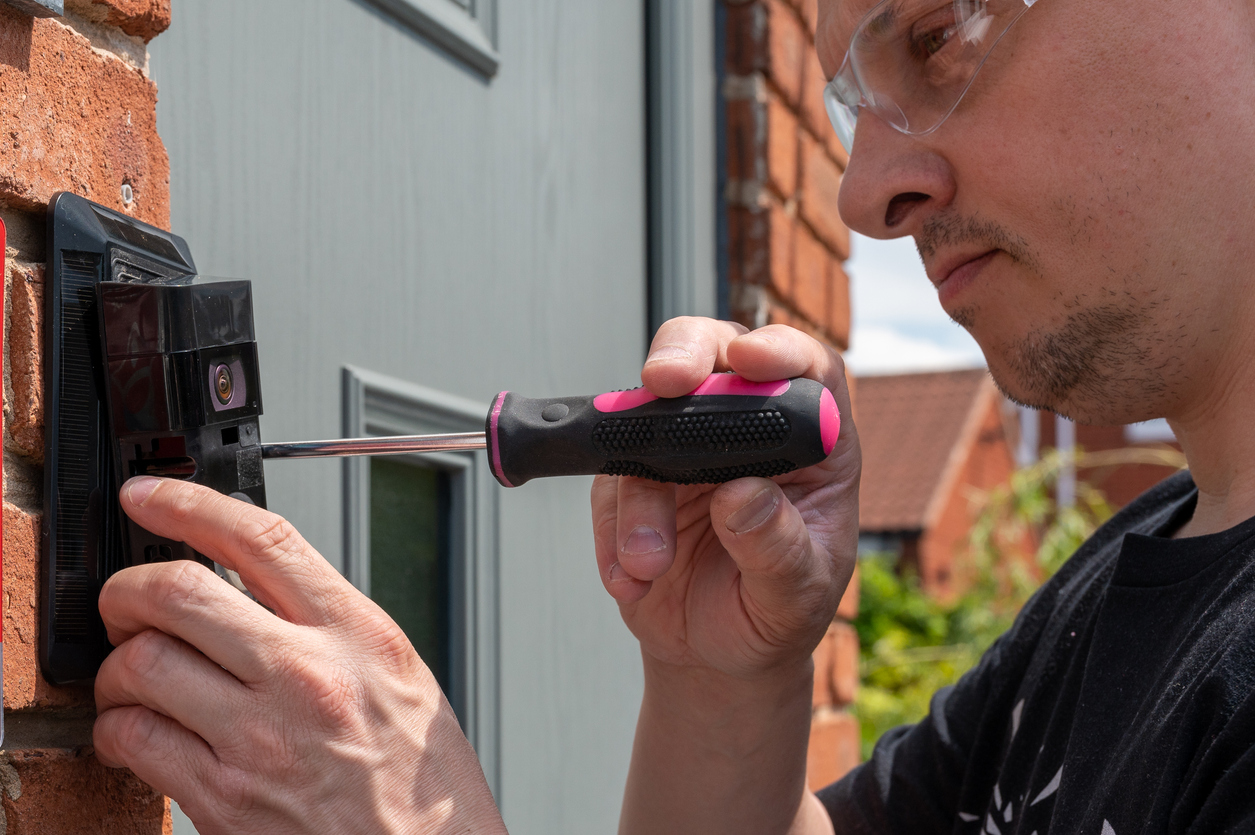We may earn revenue from the products available on this page and participate in affiliate programs. Learn More ›
Q: I have a few jobs I need to have done around the house, and some of them are electrical. It would be convenient to have my handyman take care of everything, but I’m not sure if he’s qualified to do electrical work. Can a handyman do electrical work, or do I need to call an electrician?
A: When deciding who to call for home repairs, choosing one of the best handyman services is a quick way to check off many of the items on your to-do list. However, when it comes to electrical work, there are some additional considerations that may complicate the decision of who to hire, such as state licensing requirements and the professional’s level of experience. In short, it’s best to leave major electrical projects such as rewiring or installing a new electrical panel to a licensed electrician. While some handymen can certainly do minor electrical work, such as replacing a light fixture or installing a light switch, more complicated tasks require the expertise of someone with years of experience and extensive knowledge of safety and electrical codes. Identifying a few project specifics can help homeowners determine whether the work they need done is best fit for a handyman electrician or a licensed electrician.
Most states require that professionals obtain a license to do electrical work. While some handymen have electrician licenses, it is not an industry standard.
More than 40 states in the U.S. require electricians to obtain a license before performing electrical work, though they allow apprentices to work unlicensed as long as a licensed professional supervises them. Because regulations vary from state to state, whether or not it’s illegal to do electrical work without a license depends on geographic location. In states that do require an electrician license, those caught installing wiring or doing other electrical work without a proper license will be fined. In some cases, unlicensed electrical work is considered a misdemeanor and may even result in jail time.
Although the qualifications for electrical work are different in each part of the country, it’s best to err on the side of safety. Even if the job is as simple as replacing a light fixture or installing new light switches, homeowners will want to avoid injuries, fines, legal issues, and damage to the home by hiring a licensed electrician to perform the work. This does not necessarily exclude handymen, as some have electrical training, but it’s important to check their credentials before hiring them for the job.

Handymen who do electrical work generally handle minor jobs such as replacing light fixtures or installing doorbells.
The list of handyman services offered by different handyman companies can vary widely. Depending on their employees’ experience and expertise, many professional handyman services most likely have technicians who can tackle minor electrical work. Installing a new light fixture, replacing an outlet, or putting in a new doorbell are common electrical handyman services that are generally classified as minor electrical work and are thus safe for a licensed handyman to do. However, classifications can vary by state, so it’s important to verify this before searching for “handyman for small jobs near me.”
Joel Worthington, president of Mr. Electric, a Neighborly company, says, “While handymen may handle small electrical tasks, it’s important that all national and local regulations for electrical work are performed by electricians who have undergone extensive training and possess the necessary qualifications to ensure safety and compliance with electrical codes.”
Larger projects such as rewiring a house or repairing an electrical panel are typically best left to an electrician.
While minor replacements or upgrades are the types of electrical jobs that are suitable for a local handyman service, major work such as rewiring an entire house or replacing or installing a new electrical panel requires more experience and expertise. For these jobs, it’s best to hire a licensed and insured electrician who can likely get the work done more efficiently than a handyman who doesn’t do this kind of project regularly. An electrician typically costs more than a handyman does in hourly labor costs, but an electrician will also be able to complete the job more quickly and with a superior result. Homeowners can expect the cost to rewire a house to range between $561 to $2,308, while the cost to replace an electrical panel averages $1,274.
Hiring unlicensed or inexperienced professionals to do electrical work comes with significant risks such as home damage and electrical fires.
Hiring unlicensed or inexperienced independent handyman services for electrical work poses significant risks, including the potential for home damage and electrical fires. Electrical systems are complicated, and incorrect installations or repairs can lead to serious safety hazards. Licensed professionals are trained to follow safety standards and codes, which reduces the likelihood of those risks and ensures the home’s electrical systems are operating correctly.
Improper electrical work can lead to a number of safety concerns, including:
- Overloaded circuits
- Short circuits
- Electrical equipment malfunctions
- Wire degrading
- Inadequate insulation.
All of these scenarios could lead to an electrical fire, which poses a clear risk to residents’ safety and can cause significant damage inside the home. This is why it’s advised to hire either an electrical handyman who has a license or an actual electrician.

It’s also worth noting that a homeowner’s insurance company may refuse claims for damage that is the result of unlicensed electrical work.
Even those who have a policy from one of the best homeowners insurance companies (such as Allstate or Lemonade) cannot expect to receive coverage for work done by an unlicensed contractor. While homeowners insurance may cover fire damage in some instances, policies often have clauses that state the company may refuse claims for damages resulting from unlicensed or improperly performed work, which includes electrical work. So for example, if a handyman without an electrician license makes a mistake while installing an outlet, and that mistake leads to an electrical fire that consumes the home, homeowners will not be able to rely on insurance to pay for the damage. This is another reason it’s crucial to ensure that any electrical work done is carried out by a licensed and qualified professional, whether it’s a handyman or an electrician. Hiring a licensed handyman not only helps ensure the safety and compliance of the work but also provides a level of protection in case of any unfortunate incidents. Professional electricians also carry insurance, including liability insurance, so homeowners are not held responsible for mistakes or accidents that result from their work.
Before hiring, homeowners will want to verify that their handyman is bonded, insured, and meets state licensing requirements for electrical work.
When searching online for “electric handyman near me,” it’s a good practice for homeowners to verify that the handyman who performs electrical work on their home, even if it’s minor, is bonded, insured, and meets state licensing requirements. According to Worthington,
“Homeowners can verify a handyman’s qualifications for electrical projects by checking their credentials, such as licenses or certifications, depending on local regulations. Homeowners can also seek references and reviews.” One simple option is searching for the handyman’s license on an online database like License Lookup. While it isn’t common, some contractors may claim to have a license when they do not. Checking for these qualifications can help protect both the homeowner and the handyman in case of accidents or unforeseen issues during the job. Some states may not require handymen to obtain an electrical license but instead require a contractor’s license for work that exceeds a specific dollar amount. Any structural work, such as cutting drywall or even installing a ceiling fan, may require a separate license, so it’s a good idea to double-check with the handyman before any work starts.
If there is any uncertainty about whether a handyman is qualified to take care of an electrical project, it may be best to hire an electrician instead.
Although hiring a handyman will likely cost less than hiring an electrician, it’s best to go with a licensed professional if there are any concerns about the handyman’s experience. If the handyman cannot provide references or examples of similar jobs that they have done in the past, or it isn’t possible to verify their licensing, homeowners will want to find a different professional. Even if the handyman is technically able to complete the job, a single misstep could result in a botched job. Even worse, faulty electrical work can lead to extensive damage in the home and put residents at risk if a fire breaks out or other issues arise. The best bet is to hire an electrician near you who is probably worth the extra cost just for the added peace of mind.


